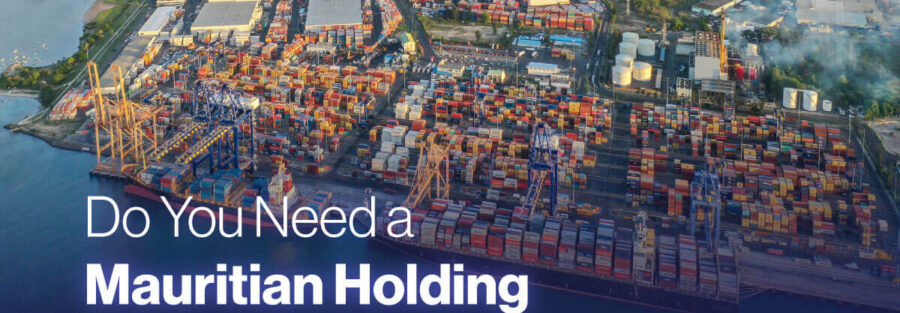Do You Need a Mauritian Holding Company? Why Entrepreneurs Choose Mauritius for Their Global Structure in 2025
Whether you’re an African scale‑up plotting a London IPO, a European family office seeking treaty certainty, or a venture capitalist juggling cross‑border investments, the jurisdiction pick for your holding company can make or break valuation, cash-flow and exit proceeds.. Mauritius offers a rare trio—common‑law familiarity, civil‑law certainty, and internationally respected regulation—wrapped in a cost profile that still makes sense for companies looking at creating value. Below, we unpack why entrepreneurs should choose Mauritius International Financial Centre for their global structure.
Understanding Holding Companies for Global Expansion
Selecting the right jurisdiction for a holding company (Holdco) should be one of the first strategic decisions a founder makes. By establishing a well-regulated, tax-efficient Holdco at the outset, the group gains immediate credibility with investors, meets substance requirements from day one and avoids the costly reshuffling that expansion can otherwise force on a growing business.
A holding company keeps the assets—cash reserves, patents and strategy—safe at the centre of the group. Day-to-day, higher-risk work happens elsewhere: one subsidiary might run a factory in Kenya, another handles nationwide distribution in Nigeria, and a third conducts R & D in India. Because each of these activities sits in its own local company, any lawsuit, tax claim or regulatory shock stops there and cannot touch the holding company’s assets. Crucially, Mauritius imposes no exchange-control restrictions, so capital can flow freely: the HoldCo can downstream funds to its operating entities when they need working capital and upstream profits as dividends when cash is surplus, all without regulatory bottlenecks.
Key Benefits of Establishing a Holding Company in Mauritius
- Risk Segregation: Keep manufacturing, sales, IP and treasury in separate subsidiaries so each business line carries its own risk.
- Capital Efficiency: Profits move up to the holding company with minimal extra tax and are redeployed where returns are highest. A central treasury account sweeps surplus balances, cuts idle funds and streamlines multi‑currency banking.
- Governance Clarity: A single holding‑company board sets strategy and approves major transactions, so geographically dispersed teams follow the same objectives. Consolidated group financial statements give investors one reconciled data set (subject to the holding company having control and owning more than 50% in the subsidiary, then the accounts are consolidated).
- Tax‑Treaty Benefits: Mauritius’ treaty network and partial-exemption regime can reduce the effective tax on qualifying foreign income.
- Exit Readiness: With all assets owned by a single Mauritius holding company, a buyer can acquire that entity without unpicking regional subsidiaries. Because Mauritius levies no capital‑gains tax on share sales, exiting founders keep more of the sale proceeds.
- Cost-effective jurisdiction – Office rents, professional fees and compliant staffing costs are markedly lower than in rival mid-shore hubs, allowing groups to maintain substance without bloating overheads.
- Qualified bilingual workforce – Mauritius supplies a deep pool of English- and French-speaking professionals—lawyers, accountants, company-secretary staff and treasury officers—experienced in cross-border transactions and international compliance.
The Company may also choose to claim foreign tax suffered on the foreign stream of income. From the year of assessment starting 1 July 2024, every company whose turnover exceeds MUR 50 million(approx USD 1.1 million) must also pay a 2 % Corporate Climate Responsibility (CCR) levy (80 % refundable when the partial exemption is taken, so the rate nudges up to about 3.4 %) on its chargeable income. Mauritius imposes no capital-gains tax from the disposal of shares, and the Mauritius Revenue Authority administers 40+ double-tax treaties which typically reduce withholding tax at source to low single digits, maximising the amount that can be repatriated to the holding company.
Most cross‑border entrepreneurs choose a Global Business Corporation (GBC) licence, which packages these tax benefits into a single, FSC‑regulated vehicle built for international holding structures.
Mauritius in the Rankings – Global Standing, Regional Lead
Mauritius routinely tops African league tables and fares respectably worldwide: it sits 15ᵗʰ out of 180 economies for Economic Freedom (Heritage Foundation 2025) and 58ᵗʰ in the 2025 Global Financial Centres Index, ranking first and second in Africa respectively. Transparency is solid, with the 2023 Corruption Perceptions Index placing Mauritius 55ᵗʰ globally and fifth on the continent. Political credentials shine even brighter—The Economist Intelligence Unit’s 2024 Democracy Index ranks the island 20ᵗʰ of 167 countries, first in Africa, while the 2024 Global Peace Index puts it 22ⁿᵈ worldwide and again first regionally. Finally, on the Mo Ibrahim Index of African Governance 2023 Mauritius ranks second, underscoring a stable, well-governed environment for investors.
Mauritius’ Strategic Location and Access to Global Markets
Situated in the Indian Ocean between Africa and Asia, Mauritius sits on the GMT +4 time‑band—allowing executives to reach Singapore in the morning and London or Johannesburg before close of business. Reliable high‑speed internet and modern telecommunications infrastructure keep virtual board meetings seamless.
Connectivity & trade advantages
- Port Louis Freeport: a bonded logistics zone that offers round-the-clock customs clearance, extensive temperature-controlled warehousing and duty- and VAT-free treatment for goods stored in the zone and later re-exported. Thanks to these “fast-lane” formalities and reliable feeder services, routing cargo through Port Louis can shorten overall transit times to East African and Gulf ports when Durban or Mombasa are congested, though the exact saving depends on the sailing schedule and season.
- Trade accords: Mauritius is party to AfCFTA, COMESA, SADC and the India–Mauritius CECPA, unlocking preferential tariffs and streamlined rules‑of‑origin for goods as well as business‑visa fast‑tracks for senior staff.
- Gateway strategy: global companies often structure African distribution through a Mauritian trading subsidiary that buys FOB in Asia, warehouses in the Freeport, and then sells into COMESA duty‑free—boosting margin by 5%–10 %.
Mauritius Legal Framework and Business Environment
- Hybrid law: English common‑law principles for corporate and security matters combine with French civil‑law clarity in contracts.
- Ease of doing business: the World Bank’s last survey ranked Mauritius 13ᵗʰ worldwide—the only African nation in the top 20.
- Human capital: English‑French bilingual professionals keep legal, audit and investor‑relations costs 30–40 % below many mid‑shore peers.
- Political stability: uninterrupted democratic governance since 1968 and an investment‑grade sovereign rating reduce country‑risk premia.
Is a Mauritian Holding Company Right for You?
A Mauritian structure delivers tax efficiency, regulatory credibility, geographic reach coupled with a robust banking system with no exchange control that many larger centres struggle to match—yet with leaner overheads. The decision ultimately hinges on your expansion map, investor mix and risk appetite.
Ready to set up your holding company in Mauritius and tap into all these advantages? Get in touch—our specialist team will steer you through the entire process, start to finish.




